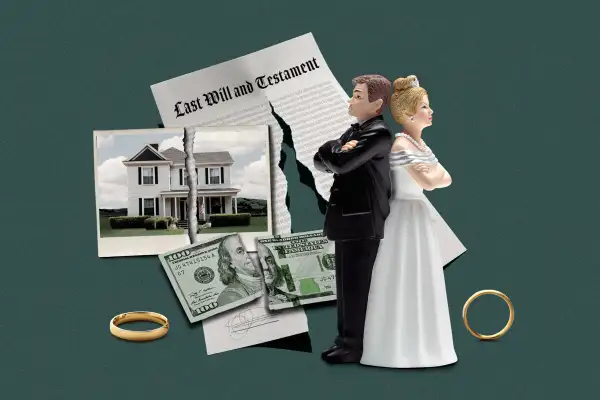How to Change Your Estate Plan During Divorce

Divorce is never easy, and estate planning can make it all the more challenging.
At such an emotional time, more paperwork is probably the last thing you want on your to-do list. But taking a few key steps is critical to your financial future.
“I’m hearing these estate planning questions more so than at any time in my career, and I’ve been at this three decades,” says Michelle Smith, founder and CEO of Source Financial Advisors and co-author of the book Divorce and Your Finances for Wachovia Securities. “This whole era has forced a new transparency: Are you organized, is your financial suitcase packed, and is everything in it ready to go? These conversations have become the norm now.”
Here's what to keep in mind:
How does divorce affect your estate plan?
For the newly divorced, typical estate-planning conversations might involve revoking or rewriting your will, to ensure that everything won’t be going to your ex-spouse. Or they might involve changing your beneficiaries, like those on your life insurance policies or retirement accounts, so that all your assets don’t revert to your ex-spouse if you pass away.
Be careful about jumping the gun on all this, though. Some of these moves must wait until the divorce is finalized.
“In the middle of the divorce process you are stuck in this weird purgatory, and it needs to be navigated very carefully,” says Shawn Leamon, a Certified Divorce Financial Analyst and host of the podcast “Divorce and Your Money”. “It’s a potential minefield. It might not feel fair or right — but it’s the nature of the process.”
Once the decree is signed, though, it’s time to start updating, and the sooner the better.
Do you need a new will?
States have many different laws about how to treat wills once a divorce goes into effect — for instance, many states automatically nix gifts you might have made to your former spouse.
Even though that part of your will could be automatically invalidated, you can and should start from scratch and revoke the whole document (assuming your intentions have changed). Remember it’s not just a matter of who you are leaving your assets to, but whom you have appointed as the executor.
This is also the area where you can name a guardian for your minor children, in cases where the parents are unavailable. As an example, perhaps in the past you named your ex’s sibling and now you want to name someone new.
In terms of how to go about all this, most estate planners suggest drawing up a new will altogether, rather than making a series of patchwork amendments on existing documents.
“People going through divorce should revoke their will and have an attorney draft a new one,” says Seth Mullikin, a planner with Lattice Financial in Charlotte, North Carolina. “Attempting to modify an existing will would likely be even more expensive.”
How and when should you change powers of attorney?
Besides wills, there are other critical estate documents that families should have — including health care directives and medical and financial powers of attorney, where you name someone to make decisions on your behalf if you become incapacitated.
In these areas, you actually do have more leeway to make changes even while the divorce is still going on. After all, if you are in the middle of a contentious divorce, you probably don’t want your ex making life-or-death decisions over your health care.
“Anyone going through divorce should get new estate documents in place to allow the appointment of other persons to fill these roles,” advises Charles Sachs, chief investment officer with Kaufman Rossin Wealth in Miami.
Lastly, don’t forget your beneficiary designations. Let’s say that you update your will after your divorce, but forget about the little matter of account beneficiaries. If you pass away, your ghost (and your heirs) might be in for a little surprise: Those designations override whatever you have in your will.
“It doesn't even matter if you have updated your will, because if you haven't updated your beneficiaries, the beneficiaries will stand,” says Monica Dwyer, a planner with Harvest Financial Advisors in West Chester, Ohio.
That’s why you should absolutely update all of those designations once the split is official, whether we are talking about life insurance policies, or retirement savings, or brokerage accounts.
It may be possible to change those beneficiaries before decrees are finalized, but that often requires the consent of the spouse. Depending on your personal situation, this might not be a conversation you're comfortable having.
More from Money:
What to Know About Dividing Life Insurance During a Divorce
Keeping Your Home After a Divorce Can Be Expensive. Here Are 5 Ways You May Be Able to Afford It